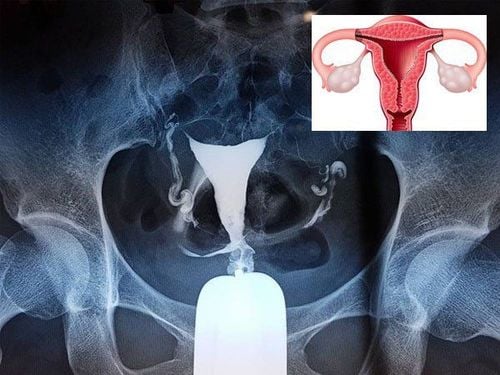This is an automatically translated article.
The article was professionally consulted by Specialist Doctor I Le Hong Lien - Department of Obstetrics and Gynecology - Vinmec Central Park International General Hospital.1. Causes of uterine fluid
Normally, in women, a fluid that includes the placenta, blood, tissues, and mucus is passed out during and after childbirth. The strong contractions of the uterus during this period also help push the fluid out, returning the uterus to its original state. In women who have an abortion, the discharge will also be removed by medical intervention or medication.However, for some reason, the fluid is not completely drained out, but stagnates in the female uterus. Stagnant fluid is usually residual amniotic fluid, blood clot from place of placenta or wound, endometrial debris, vaginal or cervical wound,...
Uterine stasis is quite common now. Common, common causes include:
Weak uterine contractions
Uterine contractions at birth and after birth is the agent that helps push the baby as well as the fluid out of the body. However, many women have a long labor, a large fetus, multiple pregnancies, polyhydramnios, etc., causing the uterus to work too hard, leading to weak contractions. As a result, the fluid is not contracted to push it out, but it stays in the uterus.

Multiple abortions damage and thin the uterine wall, causing many complications including uterine fluid retention.
Due to cervicitis
Inflammation of the cervix makes it harder for the discharge to be pushed out, while in the infected area, the secretion increases more. That is what causes this disease.
Long labor or cesarean section before labor
Long labor or cesarean delivery before labor causes the uterus not to open properly, so the fluid cannot escape.
Menstrual disorders
Women with prolonged menstrual disorders can cause menstrual blood to pool in the uterus, causing fluid retention.
2. Is uterine stasis dangerous?
Usually after 12-13 days after giving birth, the uterus shrinks, the mucus is less, and the uterus is no longer palpable. But if there is fluid retention in the uterus, the mother will see signs such as: a lot of discharge, with a bad smell, the uterus is enlarged and painful when pressed, poor defecation, may be accompanied by fever, chills, breast erection, ...According to experts, uterine fluid stasis is not too dangerous to the mother's life, but if not handled, the fluid can be released early, causing many complications such as:
Causes many gynecological diseases
Stagnant fluid Long-term in the uterus is the leading cause of the condition, infection and inflammation of the appendages in postpartum women.

Stagnant fluid in the uterine cavity contains blood, placenta, tissues, ... causing the uterus to become infected. Prolonged infection can cause fallopian tube blockage, the patient is prone to ectopic pregnancy, increases the risk of miscarriage, premature birth in later births.
Causes many effects on psychology, health
The phenomenon of uterine fluid causes many effects that make the patient's health go down, always in a state of fatigue, the intimate area has a bad odor, and frequent infections.
Affects sex life
Usually after the period of abstinence from sex after giving birth or termination of pregnancy, women will have a normal sex life. But stagnation of uterine fluid can make women no longer interested in sex, apathy, low self-esteem, ... affecting marital happiness.
Complications of uterine fluid retention are more dangerous in women after abortion, especially when abortion is left with placenta and blood clots. Along with the damaged and eroded uterine wall after the termination procedure, women may experience many signs such as: severe abdominal pain, prolonged and profuse bleeding, and blood clots, bloody discharge. dark, foul-smelling, inflamed uterus, painful when pressed, menstrual disorder or complete disappearance,...
Thus, if you see signs of suspicion of post-partum uterine fluid retention or termination of pregnancy Women need to go to a specialized medical facility soon.

3. Ultrasound to detect uterine fluid, what to do?
Ultrasound helps doctors detect and diagnose uterine fluid and its effects if any, thereby deciding on the appropriate treatment. Currently, there are two methods of treating uterine bleeding: medication and aspiration.Use of drugs
Mild uterine fluid retention, early detection is often indicated for drug treatment. The drugs are usually prescribed such as injections, soaks, intravenous drugs diluted with NaCl to promote uterine contractions stronger, pushing the fluid out.
If the patient has an inflammatory condition of the uterus, cervix or vagina, additional anti-inflammatory and antibacterial antibiotics will be prescribed.
Aspiration of the fluid
If the fluid retention is severe and the medication is not effective, the method of aspiration will be indicated. The procedure of manual cervical dilation and aspiration with a specialized tube requires clean and modern sterilization techniques and machinery. Therefore, patients should consider choosing a reputable doctor and treatment facility.
To prevent stagnation of uterine fluid after birth, pregnant women should pay attention to clean the private area, rest and exercise appropriately, breastfeed the baby early, do not tighten the abdomen too tightly so that the fluid is expelled. Green tea, egg tofu soup, and spinach soup are also very good for women with uterine fluid retention.
Specialist I Le Hong Lien is an obstetrician-gynecologist at Vinmec Central Park International Hospital since November 2016. Doctor Lien has over 10 years of experience as a radiologist in the Department of Ultrasound at the leading hospital in the field of obstetrics and gynecology in the South - Tu Du Hospital.
Please dial HOTLINE for more information or register for an appointment HERE. Download MyVinmec app to make appointments faster and to manage your bookings easily.














